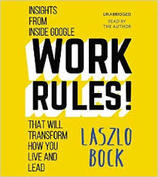 I had the pleasure of hearing Laszlo Bock talk at Google about his new book, Work Rules!: Insights from Inside Google That Will Transform How You Live and Lead. Following the talk, I read the book and was able to reflect on what I learned. Having seen him in person, I can say that his personality and passion for improving people's work lives really comes through in his writing. There's not much new that I learned given that I've experienced a lot of what Google People Ops takes care of firsthand. In fact, I was a bit shocked about how much detail the book went into and wondered if Laszlo got into any trouble with respect to confidentiality/trade secrets. I found it really interesting to hear about all the scientific studies and data/analytics that went into the design of the various perks and programs. It was also interesting to hear about how things evolved over time, and I really appreciated his devoting a chapter to the mistakes Google has made and lessons it learned from that. One of my biggest takeaways is how much managers and work environments matter. Engineers think those things don't make much of a difference, but Laszlo cites numerous primary and secondary studies that show this preconception is false. Below are my full notes. I highly recommend the book to anyone who wants to really get a deep glimpse about how HR and perks really work at Google. Preface High freedom work environment Manager serves the team. Remove roadblocks. Not about rewards and punishments. 1 Becoming a founder Founders both got Montessori education Hiring by committee Employees sharing what working on as tech talks Ownership sharing Free meals Encouraging women to code Giving freedom Mixing ppl on projects Let others act as founders and lead 2 culture beats strategy Mission, transparency, and voice Make all performance transparent 3 hiring most important people activity Better to hire the best than to hire medium and train Hire more slowly Only hire people who are better than u Managers don't pick own teams 4 searching for the best Internal referrals Internal search team finding good people at other companies Be specific in what seeking 5 don't trust your gut in interviews Avoid brain teasers and behavioral questions General cognitive ability Emergent leadership (informal) Googleyness Comfort with ambiguity Role related knowledge Conscientiousness Written feedback Set a high bar for quality Find your own candidates 6 let the inmates run the asylum Does ur manager trust u Take away power from managers Eliminate status symbols No power to hire or promote Make decisions based on data not manager opinion Run experiments to make decisions 7 why everyone hates performance management Focus on purpose not process OKR Numerical ratings in 5 levels Calibration across managers to remove bias Review list of common biases before each meeting Split reward convos from development convos Gather peer feedback 8 the two tails: opportunities are in best and worst employees Be a good coach Empower the team but don't micromanage Express concern for individuals well being Be very productive and results oriented Be a good communicator; listen and share info Help the team with career development Have a clear vision and strategy for the team Have important technical skills that help advise the team 9 building a learning institution Deliberate practice with feedback on small actions repeated over again Build repetition into training Best teachers are internal Compare identical groups who receive or don't training and see how they perform differently or not 10 pay unfairly Celebrate accomplishment not compensation Human performance has power law Experiential awards and gifts better than cash Peer bonuses Share bad news and bugs and learn from mistakes 11 best things in life are free Small perks Efficiency Community Innovation Make lives easier for employees 12 nudge a lot Send checklist emails Separate how stuff is vs ought to be 13 biggest people mistakes A crisis is an opportunity for impact 14 what u can do starting tomorrow Give ur work meaning Trust ur people Hire only ppl better than u Don't confuse development with managing performance Focus on the 2 tails Be frugal and generous Pay unfairly Nudge Manage rising expectations Enjoy and iterate Afterword: people operations Mass customization
1 Comment
Some recent interactions with medical researchers and conferences I've attended have caused me to think about incentives in the field of research, and I'm quite worried.
First, I've realized how extremely finicky and sensitive the scientific process is. Final results can be significantly skewed in the "wrong" direction by variations in equipment, ingredient formulations, specific techniques, and parameters used. Many intermediate ingredients (cells, RNA, etc.) are available off the shelf, which seems convenient, but often has the risk of quite variable quality (I personally saw researchers re-ordering some RNA compound because twice they received something that failed to work as advertised). The scientific process is complex, difficult, and still so labor-intensive. You would think that in the 21st century the "rote" work would all be outsourced to cheaper labor destinations and/or fully automated with machines, but that's still far from prevalent. Science is still being done in many of the most prominent research universities in a form that's closer to high school chemistry than to 2001: A Space Odyssey. Secondly, I've frequently heard about "publish or perish" and the extreme focus on publishing positive, statistically significant results. This makes people care more about quantity than quality and on "proving" hypotheses right rather than disproving them or trying new techniques, even if they don't work. There are no rewards for failure, and you can't get a patent for trying. In professional science, as opposed to school, there is unfortunately no "A for effort." And I think we lose a lot of valuable information and create a lot of wasted time by duplicating techniques instead of sharing with each other by publishing things like, "I tried these 5,000 combinations. They didn't work. So if you read this, you might want to try something else." This results in several complications to the pure pursuit of knowledge and improvement of the human condition. The best publications are peer-reviewed, and the "peers" are the ones competing with the authors for the same publication slots. The one-way anonymity (not double blind) means that people scratch the backs of their friends and form "societies" (which like to meet at conferences) that are really like old boys' clubs for cheering each other on and publishing each other's work. Also, the focus on publishing creates so much published research that no one can follow it and keep track of it. I'm always shocked when I see scientific citations listing that an article was on pages 1,056-1,064. Who out there is reading thousand-page long journals? I see the same problem with patents: sure, publishing research and filing a patent make the knowledge accessible (when searching for it) but they don't make it prevalent and don't cue anyone to read the findings by themselves. In addition, because of the drive to publish quantity and show "results" even when they're suspect, it drives the quality of research down, yielding false results. John Ioannidis at Stanford wrote about how too much medicine relies on flawed assumptions, explaining how most published research findings are false. The WSJ wrote several articles explaining how pharmaceutical companies are unable to reproduce most research findings (see above about scientific complexity and sensitivity to specific conditions and compounds). It's like we're giving people prizes for trying something a thousand times until finally they get lucky enough (or are careful enough) to produce something scientifically significant instead of rewarding them for working hard and producing truthful results (and sharing their experiences either way). I'm not trying to diss researchers or publications or universities. I know almost all the individuals are honest and extremely hard-working and do believe in the deeper goals of science. I just think the current system is sub-optimal, and I don't know how to fix it. I'm curious to hear what others think.  I'll keep this post short, as the message is pretty simple (but hard to implement in real life). We had a guest speaker in my finance class who was a private equity manager. Of all things, he chose to focus his talk on incentive alignment. As a private equity firm buys an existing company, they need to incentivize either the current or replacement management to achieve the company turnaround or growth goals that are planned from the beginning. He taught us that the status of incentive alignment explains performance. No matter what, people will be driven by the incentives placed before them and work to optimize the incentive formula, not necessarily the company's long-term value. He also pointed out that incentives may be good per individual but bad when mixed together. For example, sales people may get commissions on sales; marketing may get bonuses based on brand surveys; the CEO may get bonuses based on stock price. When looking at each individually, it seems like the incentive makes sense based on the individual's role and department. However, when combined into one organization, the incentives can often be at odds with each other and not have a lot of cohesion. Tying everyone to one incentive system also doesn't work that well because of different people's limited control over parts of the business that are not their own and the problem of free-riding, where some may benefit at the hard work of others. Finally, our guest taught us why it's hard to align incentives for the long term: things are changing all the time for a company, and it's hard to constantly revise incentive plans accordingly. Because incentive plans are forward-looking by nature (whereas company plans are drawn up based on past performance and the present outlook), there is always a lag in responding to a changing market environment when updating incentive systems. In addition, there's a sense of stickiness to incentives once put in place; if people got hired with a specific incentive scheme promised to them, it may be hard to renegotiate this. However, it's probably the right thing to do in the long run, and many companies probably are better off anyways without people who focus on incentives and compensation over learning and producing results. I've always been interested in the subject of incentives and compensation and am simultaneously frustrated and curious about the issues at play because there is clearly no right answer or optimal solution. I hope to learn more about this topic next quarter in my Pay & Rewards class. |
Archives
June 2024
Categories
All
Subscribe |

 RSS Feed
RSS Feed
